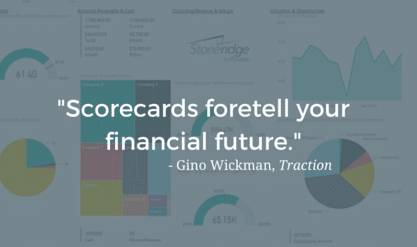Finding the Scorecard Metrics that Matter to Your Business
 I've been on a kick lately to get all of our clients thinking about how they can use a scorecard to run their businesses better. It's certainly made a huge difference for us at Stoneridge Software in that we have a much better idea of the key indicators and how they are performing each week. I talked to a client yesterday and they asked me the common question, "What metrics should we have on our scorecard?" How should you decide which business scorecard metrics matter the most to your company?
I've been on a kick lately to get all of our clients thinking about how they can use a scorecard to run their businesses better. It's certainly made a huge difference for us at Stoneridge Software in that we have a much better idea of the key indicators and how they are performing each week. I talked to a client yesterday and they asked me the common question, "What metrics should we have on our scorecard?" How should you decide which business scorecard metrics matter the most to your company?
I can't tell a client exactly what they are going to want on their scorecard, but I want to do my part to give them lots of potential options and they can decide from there. Ultimately, you don't want to have 100 metrics on your scorecard; you want between 5-20, only those metrics that will cause you to take some kind of action. So I'd like to point you to a few great sources for potential metrics based on your industry.
Scorecard Metrics for All Businesses
Every business has customers, makes sales and has employees. So here are a few metrics that will likely apply no matter what industry you are in:
- Cash balance - everyone needs to know how much they have in the bank
- Accounts Payable balance may not be critical in every business, but it affects your cash flow projection
- Accounts Receivable - you want to focus on several measures here - the total balance, the balance that's past due, the clients who have the biggest past due balance, average days to collect and days sales outstanding
- Sales - sales per week, number of new leads, number/revenue of new opportunities, overall pipeline, etc.
- Team Members/Employees - how many employees do you have this week, how much productivity did you get from them in the past week
- Customer Satisfaction - this can be more difficult to measure in certain businesses, but how did your clients rate their interaction with your team
Every business should have 3-7 metrics related to the items above on the scorecard each week. What you call it or how you calculate it may be different, but you're going to want to understand those key values.
Professional Services Metrics
Stoneridge Software is a professional services firm and falls into this category. Anyone who is selling the time of your employees would fall into this category as well. In this industry you'll want to keep track of certain metrics to best manage your business.
- Billed Hours / Utilization - the most important metric to a professional services firm is how much of your team is billable and how many overall billable hours did you achieve last week
- Available Resources to Bill - this relates to utilization, but it gets to what percentage of the workforce is billable and how quickly your new hires are ramping up to be able to bill
- Weekly Revenue & Margin - how much did you bill over the past week and what's the overall margin delivered back to the business based on that revenue
- Weighted Pipeline - how much work do you have coming in based on the probability of closing current opportunities
- Backlog - what is your utilization looking to be a few weeks or a few months in advance.
Last year we participated in a benchmark study of professional services firms done by Service Performance Insight. They published their results for services firms here: http://spiresearch.com/spi-research/reports/2016psmb.html. To get a sense of the metrics they review, click on the Table of Contents link at the bottom of that page. Of course, I encourage you to read the full report - it's worth the money.
Distribution Center Metrics
Many of our clients are either distribution centers or manufacturers who have distribution centers, so these metrics can apply if you are storing and moving goods in any way. One good thing I've noticed about distribution centers - they all believe in metrics. I have yet to visit with a distribution center that has no idea how long it takes to get their product or their percent of accuracy.
- On-time shipments - the most important metric to a distribution center is, did we get the product where it was supposed to go when we promised to deliver it? If you do that, you're doing well. If you're not, you'll have customer satisfaction issues
- Internal Order Cycle Time - how long did it take you from receipt of the order to get the order out the door? This speaks to the overall efficiency of the operation
- Order Picking Accuracy - how well are you able to pick or build the appropriate item? This is an overall measure of quantity
- Warehouse Capacity - how much capacity of your warehouse or warehouses are you using? If you are using more than you have, you have to build or lease a new building.
The Warehouse Education and Research Council prepared their annual report on distribution center metrics, and I encourage you to read that if you are a distribution company. You can find the DC Measures Annual Survey here. Again, it's well worth the money to understand how you are performing against your peers in the industry.
Manufacturing Metrics
Again, many of our clients are manufacturers so they want to be able to measure the overall throughput and accuracy of their process. Like distribution centers, manufacturers generally have a good idea of how they are doing.
- Yield - what is the total number of units that can be cranked out in a given period of time (day/week).
- Capacity Utilization - how much time of the people and equipment are being utilized per shift - are you getting the most production possible?
- Returns/Quality - how much rework needs to be done on manufactured items and how many end up being returned by end clients?
There's a blog article 28 Manufacturing Metrics that Actually Matter (The Ones We Actually Rely On) that lays out 28 metrics that would be applicable to manufacturers. Since manufacturers also distribute their product, you'll see overlap between manufacturing and distribution metrics.
Metrics That Matter Summary
Every business is different but you are very likely to use some variant of the metrics outlined above. My goal is that this helps you get started on your journey to build a scorecard and you can refine the items you want from there. After reading all these reports, I've put together a list of 160 metrics that businesses may want to use based on the type of business and what's important to them. No one should use all 160 - but if you pick the most important 15 for your business, you'll have much greater visibility into your business and be able to make adaptations to your ever-changing business environment.
Let us know if there's anything we can do to help you enable your business with better metrics.
Under the terms of this license, you are authorized to share and redistribute the content across various mediums, subject to adherence to the specified conditions: you must provide proper attribution to Stoneridge as the original creator in a manner that does not imply their endorsement of your use, the material is to be utilized solely for non-commercial purposes, and alterations, modifications, or derivative works based on the original material are strictly prohibited.
Responsibility rests with the licensee to ensure that their use of the material does not violate any other rights.





